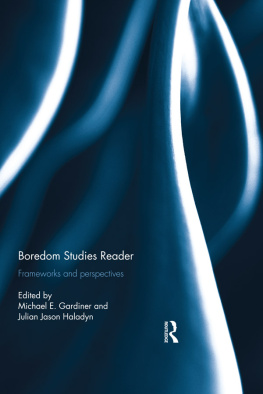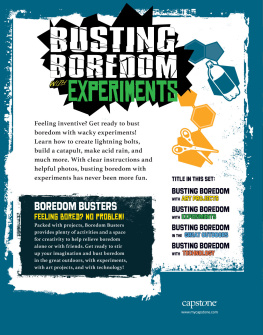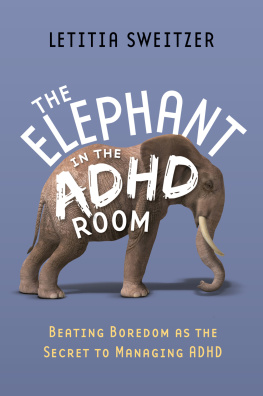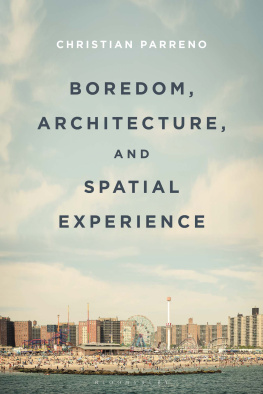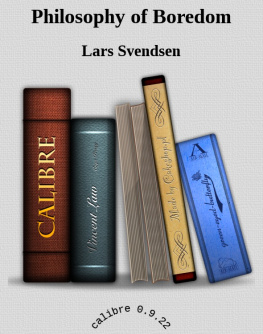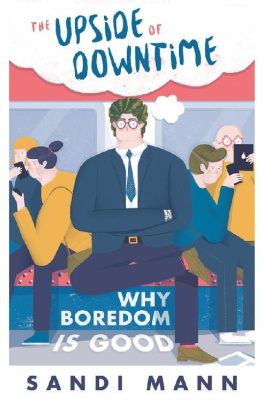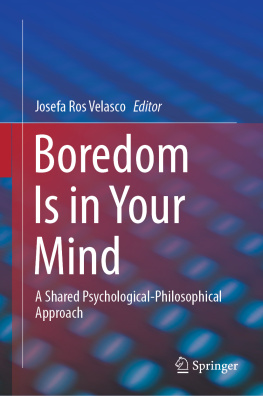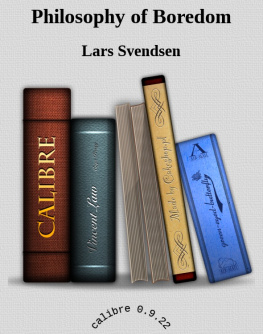First published 2017
by Routledge
2 Park Square, Milton Park, Abingdon, Oxon OX14 4RN
and by Routledge
711 Third Avenue, New York, NY 10017
Routledge is an imprint of the Taylor & Francis Group, an informa business
2017 selection and editorial matter, Michael E. Gardiner and Julian Jason Haladyn; individual chapters, the contributors
The right of the editors to be identified as the authors of the editorial matter, and of the authors for their individual chapters, has been asserted in accordance with sections 77 and 78 of the Copyright, Designs and Patents Act 1988.
All rights reserved. No part of this book may be reprinted or reproduced or utilised in any form or by any electronic, mechanical, or other means, now known or hereafter invented, including photocopying and recording, or in any information storage or retrieval system, without permission in writing from the publishers.
Trademark notice: Product or corporate names may be trademarks or registered trademarks, and are used only for identification and explanation without intent to infringe.
British Library Cataloguing in Publication Data
A catalogue record for this book is available from the British Library
Library of Congress Cataloging in Publication Data
A catalog record for this book has been requested
ISBN: 978-1-138-92746-9 (hbk)
ISBN: 978-1-315-68258-7 (ebk)
Typeset in Times New Roman
by Wearset Ltd, Boldon, Tyne and Wear
Part V
Boredom and its discontents
Chapter 16
Boredom and the origin of philosophy
Mark Kingwell
Langeweile
According to a colleague of mine I have not been able to confirm it independently there was once to be seen in the Berlin U-Bahn system a poster depicting a young man with a dull expression on his face, the very image of a mind gone blank. The poster bore the legend, possibly ironic, Die Langeweile ist der Ursprung des Philosophierens. Boredom is the wellspring of philosophers.
Langeweile has, of course, a long existing tradition in German of indicating a state of boredom with particular significance; that is, not merely being enervated by specific experience or person, but of descending into a state of boredom we might legitimately call existential. The question remains, though, whether this state of being is properly associated with the origin of philosophical reflection, or what in phenomenology would be styled as a bracketing of the natural attitude in order to reveal the structure of consciousness itself. An alternative account of origin here would posit deep boredom as a necessary condition for reflection not just on the twinned burden and gift of consciousness, but also on the associated question of the meaning of life. Are we, when profoundly bored, especially susceptible to the large philosophical questions of mindedness, life, and death?
If one is to make such a claim, one must defend not merely boredoms status as a philosophy-inducing experience, but likewise compare it with other candidates for the origin-of-philosophy status. Traditionally, these have included wonder (the Greek concept of thaumazein , as found in Platos dialogues, especially the Theae-tetus ) and more direct confrontation with the prospect of death (as in Ciceros famous claim that to philosophise is to learn how to die). Can boredom vie with these canonical, and apparently more respectable, accounts of the origin of the philosophical attitude? If so, what kind of boredom is in play? Is it distinct from what we might call routine or non-philosophical boredom? If so, how? Further, can the philosophy-inducing species of boredom be sought out actively, or does it visit us adventitiously? Are there specific mechanisms of reflection that leverage boredom into more active and explicit forms of philosophical thought?
In what follows, I will address all aspects of this issue, taking seriously the idea that boredom is a philosophical wellspring but also retaining appropriate philosophical scepticism concerning the basic claims. I will also address cognate issues concerning those who would resist or demonise boredom, as in, for example, the fiction of Kingsley Amis, often interpreted as a writer whose vision was informed by a hatred of boredom. I will then attempt to reconstruct the phenomenology of any possible transition from the state of boredom to the (presumptively valuable) state of active philosophical reflection. The implications of this shift are obvious: if philosophical thought is indeed worth cultivating, then perhaps boredom has a special, and heretofore underappreciated, place in the range of everyday human consciousness.
But I will conclude with some more nuanced thoughts about the status of philosophical reflection itself. Perhaps this state (or states) of mind is not, on further reflection, in fact presumptively valuable after all. This last turn of thought concerning thought might then open up the possibility that boredom serves not as a welcome, if unusual invitation to reflection but, rather, as a kind of distant early warning system about the perils of consciousness becoming too aware of itself. Even as philosophy attempts to sort out the special status of boredom in respect of its relations to (among other things) desire, time and the state, the discourse of philosophy the sharp end of the stick doing the sorting is liable to all kinds of threats that reduce it to boring status. Philosophys beginning is, in the peculiar fashion, also its end. This is what I propose to call the Vicious Circle of Philosophical Boredom.
There is no escape from this circle, but I will suggest that there are more or less creative, and happy, ways in which we can approach our perpetual ensnarement in its always-renewing coils of consciousness.
Dreadful boredom: Schopenhauer and Kierkegaard
The psychoanalyst Adam Phillips begins one of his best essays this way:
Every adult remembers, among many other things, the great ennui of childhood, and every childs life is punctuated by spells of boredom: that state of suspended anticipation in which things are started and nothing begins, the mood of diffuse restlessness which contains that most absurd and paradoxical wish, the wish for a desire.
(Phillips 1993: 68)
The wish for a desire: it is not restricted to children, and though it may be judged absurd and paradoxical, it is nevertheless common and urgent. The stall of desire working against itself is the beginning, but not the end, of boredom. And thus boredom understood in terms of desire is a first clue to boredoms special ability to initiate philosophical reflection, but there are further clues to decipher, and a more complicated solution to confront concerning the mystery of consciousness.
Schopenhauer is the dean of boredom studies, the first philosopher in the Western tradition to take seriously a condition which he recognised would become increasingly common. In part, this was so because the material conditions of life allowed it: for a significant segment of the emergent bourgeois population, for whom the necessities of life were reliably secured, the questions of what to desire and what to do were no longer answerable in a straightforward, even pre-reflexive manner. To be sure, the medieval philosophers and theologians had dissected the particular vice of accidie , or melancholy torpor, which bears an emotional affinity to boredom. But this benighted condition, rooted alike in Greek and Christian notions of virtuous action, is shaded as a failure of spirit that might preclude the execution of ones duty, rather than an emotional and existential condition that is the wholly rational response to ones social and cultural condition.

